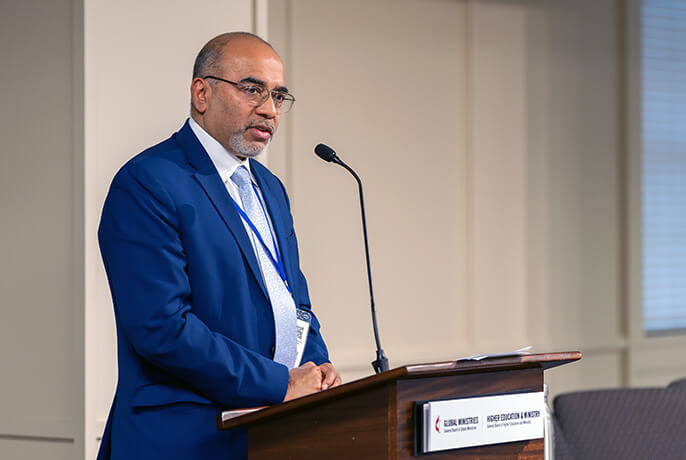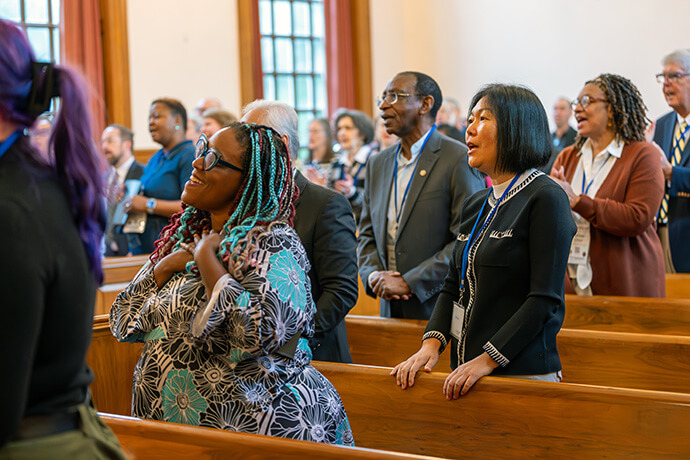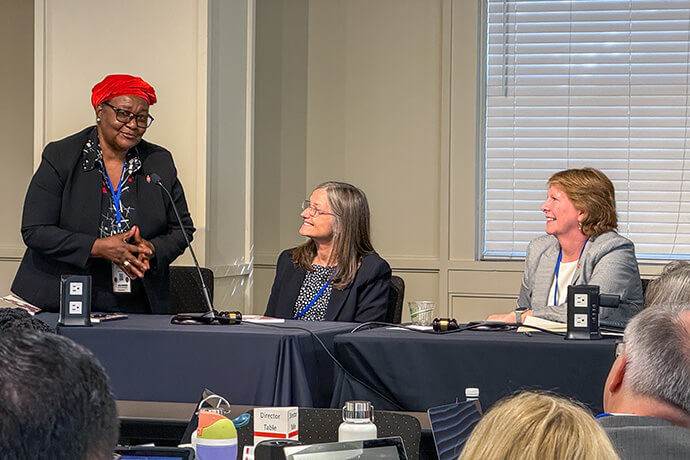Key points:
- Change, including cuts, will continue as the leadership of Global Ministries and Higher Education and Ministry work more closely, but no merger is planned.
- Both agencies are losing about 50% of the money they receive from apportionments — shares of church giving.
- Roland Fernandes was re-elected as the top executive of both agencies for the 2025-2028 quadrennium.
Despite leaner budgets and more cuts likely, employees at two key United Methodist agencies need to forge on with hope rather than anxiety, said Roland Fernandes, the leader of both.
“This is the time when we must dig deep in our faith in God and hold on tight to hope, trusting in God to be our strength every morning, whether on a personal, organizational or global level,” said Fernandes, the top executive of the United Methodist Board of Global Ministries and United Methodist Board of Higher Education and Ministry, on Oct. 15. He’s been with the former agency almost 30 years, and the latter about three months.
“When we ground ourselves in hope, when we allow hope and not anxiety to direct our sight, then we notice that there are signs of hope around us, too,” he added.
During the Oct. 14-17 joint board of directors organizational meeting of Higher Education and Ministry and Global Ministries at the Denman Building, planning for a future of close collaboration moved forward. Although Fernandes was careful to stress that Global Ministries and Higher Education are not merging, they are going to be working more closely with each other, combining resources and consolidating leadership.
The Board of Higher Education and Ministry connects the church and academics and prepares leaders for ministry. Global Ministries connects the church in mission through missionary placements and seeks to alleviate human suffering. Global Ministries includes the United Methodist Committee on Relief, the humanitarian relief and development arm of The United Methodist Church.
Higher Education and Ministry and Global Ministries are working on shared services for information technology and shared platforms for giving, project management and expense-travel, reported the Joint Administrative Matters Committee.
“There are currently 17 shared positions across the two boards,” according to the report. Shared positions include IT, marketing and communications, legal services and fundraising.

Among the outcomes of the meeting, Fernandes was re-elected as the top executive of Higher Education and Ministry and Global Ministries for the 2025-2028 quadrennium. Budgets were approved, a $17 million fundraising campaign was announced, and Fernandes emphasized that both boards need to prioritize helping the church, not protecting turf.
“What I heard is that our goal is not simply self-preservation, and it’s a biblical approach,” said Katie Z. Dawson, assistant to the bishop in the Iowa Conference and a board member of Global Ministries, in an interview. “The goal is to give ourselves away. It’s about that self-emptying love of God, and so we are here not to serve ourselves but to serve the mission of the church.”
The 2025 budgets of $48.5 million for Global Ministries and $29.6 million for Higher Education and Ministry were approved. UMCOR, which includes the allotment for Global Health, is budgeted for $39.5 million. Global Health expands the options for health care in underserved communities, while UMCOR offers help around the world when disaster strikes.
“The actions of General Conference (in April and May) included a substantial cut on apportionment proceeds, specifically a 50%-plus reduction to both agencies,” Fernandes said. “Since our agencies are very heavily dependent on apportionment dollars, as we do the budget, reductions will be coming.”
Apportionments are shares of church giving that fund the work of bishops, general agencies and other denomination-wide ministries.
General Conference delegates approved a 2025-2028 denominational budget of $373.4 million. That total is contingent on collection rates being at 90% or more for the next two years. If giving is below that percentage, the budget bottom line will be $353.6 million.
That is between 38% and 41% lower compared to the $604 million budget the 2016 General Conference approved.

Higher Education and Ministry and Global Ministries have already cut their expenditures the past few years in anticipation of lower funding.
“We have reserves to cover the deficit in the short term,” Fernandes said. “Spending these reserves will help protect key programs of both agencies which are effective. However, we will need to work over the next year to determine how we can balance the budget in the long run. This will be difficult work involving mission and involving people, but the steps we have taken over these last years will allow us some flexibility and time.”
Global Ministries has about 130 staffers, and Higher Education and Ministry about 40, Fernandes said.
Subscribe to our
e-newsletter
“The goal of this alignment is to achieve a unified presence and an integrated structure for our two agencies. … But that does not mean it’s the merger of two agencies. … It does, however, mean that the two agencies will function like one to the extent possible,” Fernandes said.
A campaign to raise $17 million for the two agencies’ work in the next 18 months will be led by the contractor CCS Fundraising of New York.
“I still get the envelope from UMCOR to send money in, and I don’t need it,” said Bishop David Wilson of the Great Plains Conference and president of UMCOR. “I can get online and do that now. I know people like my mother, who is 91, she needs an envelope, and those are people who give, and sometimes considerably.
“But if we can capitalize on the most recent techniques on how we raise funds and how we tell the story across the church, I think that helps us all.”
More job losses are possible as the process of consolidation goes forward, Fernandes acknowledged. He pledged “transparency and openness as much as is possible in different contexts,” regarding future plans.
“There are no conspiracies,” he said. “We really prayed first for the Holy Spirit’s guidance in this, because that’s why we’re here first, and not because of any one of our ambitions.”
The Rev. Jenny Phillips, director of environmental sustainability at Global Ministries, said in an interview that possible cuts haven’t affected her attitude toward her work.
“If I were driven by fear, it would be hard to get anything done,” Phillips said. “I don’t spend a lot of time worrying about change in the church, because I just know that somehow I will continue to express this ministry, my calling. … I’m an elder, and so appointments change year to year. I never have an expectation of staying in one place of ministry.
“I’m just here as long as God calls me to be here.”

The Joint Executive Committee said in its report that the Course of Study, the alternative theological educational program for licensed local pastors, needs to be revised “to provide more equitable, flexible, contextual and affordable access to theological education.”
A working group of stakeholders will be formed to investigate options and come up with recommendations for Course of Study requirements, Fernandes said.
UMCOR Committee updates included reports about global migration and the Yambasu Agriculture Initiative in Africa, the Health Systems Strengthening Program, Maternal Newborn and Child Health, Imagine No Malaria and Water, Sanitation and Hygiene.
Jim Cox, the new executive director of UMCOR, was introduced by Fernandes on Oct. 17. He comes from Helen Keller International, where he served as chief operating officer.
“Jim is not new to UMCOR, having served for almost 10 years in various capacities,” Fernandes said. “Jim’s expertise in program management includes emergency interventions … and health initiatives in partnership with vulnerable communities, major donor agencies and private foundations.”
Cox spoke briefly, saying there is a “new global reality,” with issues like climate change, migration, health, food security and natural and man-made disasters all major challenges.
“What I’ve seen since coming back is a lot more collaboration,” Cox said in an interview. “Conferences have significantly diversified their ability to access other funding. I think that’s going to have to be a trend if we’re going to continue to see these large-sized disasters.
“How do we then diversify our access to money?”
The two boards will next meet April 10-12 in Atlanta, Fernandes said. Africa is being considered for the April 2026 meetings.
“The directors last quadrennium found the visits to Cambodia and Africa very, very helpful for their knowledge of the work,” Fernandes said in an interview after the conclusion of the board meetings. “We’ll have to see where we are budget wise.”
Patterson is a UM News reporter in Nashville, Tennessee. Contact him at 615-742-5470 or newsdesk@umcom.org. To read more United Methodist news, subscribe to the free UM News Digest.




